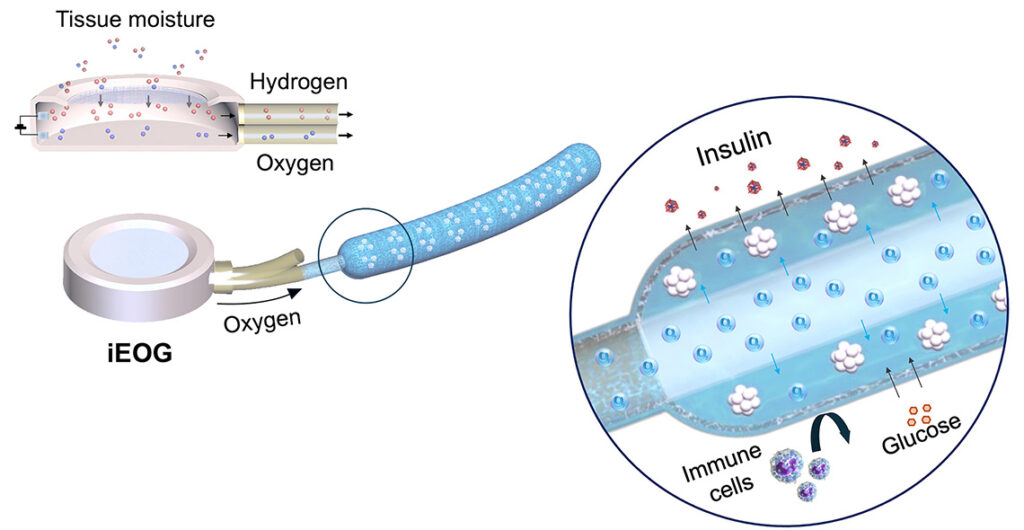—Rats effectively cured of diabetes during study period
“A Continuously Oxygenated Macroencapsulation System Enables High-Density Packing and Delivery of Insulin-Secreting Cells”
Ithaca, NY—August 11, 2025, 5am Eastern time—A research study published online in Nature Communications this week shows success in tackling a major hurdle in stem cell treatment—providing the encapsulation and oxygenation needed to enable the health and longevity of stem cells—in this case in an insulin-generating implant for diabetes. Researchers used the encapsulation technology behind the Persista Bio Inc. O2Line™Cell Delivery System, where electrolysis continuously supplies oxygen to densely packed cells implanted in diabetic rats. This study showed reversal of diabetes without the need for immunosuppression. These results show the potential for a compact, oxygen-supported therapy without the need for immunosuppression, opening the future therapeutic treatment to the broad population of patients with type 1 diabetes. This would manage diabetes completely naturally without the need for finger sticks, sensors or pumps with better long-term outcomes for patients.
The study, “A Continuously Oxygenated Macroencapsulation System Enables High-Density Packing and Delivery of Insulin-Secreting Cells,” was partially supported by the National Institutes of Health, the Hartwell Foundation, Breakthrough T1D and Novo Nordisk Company. The lead authors, Tung (Brian) Pham and Phuong (Lora) Tran, from the Department of Biological and Environmental Engineering at Cornell University conducted the preclinical studies at Cornell’s Minglin Ma Lab. Access the article at Nature Communications, DOI: 10.1038/s41467-025-62271-2.

“This research shows the success of the technology behind Persista Bio™’s O2Line™ Cell Delivery System,” said Linda Tempelman, Ph.D., one of the study’s authors from Giner Labs and now CEO of Persista Bio. “Allogeneic stem cell therapy approaches like ours which use one stem cell line for all patients are scalable to serve a large population whereas existing autologous therapies must be custom developed for each individual—at a prohibitive cost and timeframe. Our technology will enable a treatment for Type 1 diabetes that will allow patients to live, eat and exercise as if they don’t have the disease and will be commercially scalable. The cell implant system has broad potential to be used with other stem cells to treat additional chronic diseases and conditions such as inflammation, obesity, or pain control,” she added.
“People with type 1 diabetes are waiting for a cure that doesn’t require immunosuppression,” said Dr. James Shapiro, a leader in islet transplantation and cell therapy research, and professor of surgery, medicine and surgical oncology at University of Alberta. “This publication demonstrates the potential of curative cell therapies with oxygenated, encapsulated implant technology to fill this need.” Dr. Shapiro serves as a medical advisor to Persista Bio and has published with the Cornell team.
“We are proud to contribute to the impressive results achieved by the team,” said Andy Belt, President of Giner Labs, which participated in the research and has licensed their oxygenation technology to Persista Bio. “Giner Labs develops innovative solutions to global health challenges, and our dime-sized implantable oxygen generator is a giant stride for getting life-saving and life-enhancing stem cell therapies into the market. Our technology for generating life support oxygen is already used in US Navy submarines and by NASA, but this new application has the potential to improve the lives of tens of millions of people all over the world.”
Researchers from Cornell University and Giner Labs used a patented miniature implantable electrochemical oxygen generator (iEOG), developed by Giner, to provide continuous oxygen generation to encapsulated pancreatic islets, via electrolysis of water in the body’s tissue. Encapsulation technology developed at Cornell University protected the rat islets from the host immune system while allowing optimal exchange of nutrients and self-regulation of their insulin secretion to control glucose. This system allowed the cells to maintain healthy cell function even in the low oxygen environment of the subcutaneous space and at the high density that is needed for therapeutic levels of insulin production. The oxygen supported encapsulation system reversed diabetes in rats during the study period, for up to the 12-week study period. The system’s immunoprotection, the extended cell viability, and the scalability offered by the technology, have cleared the major hurdles for successful clinical stem cell therapy for a curative treatment of metabolic diseases like Type 1 diabetes.
The next step is preclinical studies in a large animal (porcine) model which is more representative of implants in humans. Persista Bio is in discussions with potential funding partners for this work. The company is seeking stem cell partners in the diabetes space, as well as biopharma collaborators to bring this cell therapy advance to additional therapeutic areas.
About Persista Bio Inc.
Persista Bio™ is a seed stage biotherapeutics company based in Ithaca, NY, developing technology designed to revolutionize the cell encapsulation space. Persista Bio’s O2Line™ Cell Delivery System can address a variety of chronic diseases, starting with type 1 diabetes. The company is licensing technology from Cornell University in Ithaca, NY and Giner Labs in Newton, MA. For more information on Persista Bio, visit www.persistabio.com and follow us on LinkedIn.
About Giner Labs Inc.
Giner Labs Inc. is a world leader in electrochemical technologies with over 50 years of innovation and success. The company, based in Newton, MA, specializes in developing and manufacturing electrolyzer and fuel cell technologies, batteries and electrochemical sensors for a wide range of applications, including life sciences.
###
Images and captions for news media here.
The caption page will download and will contain links for the images.